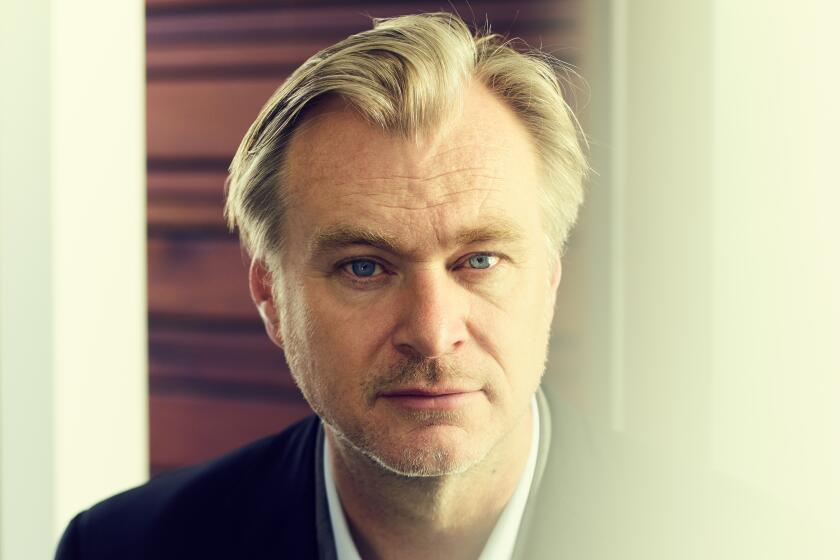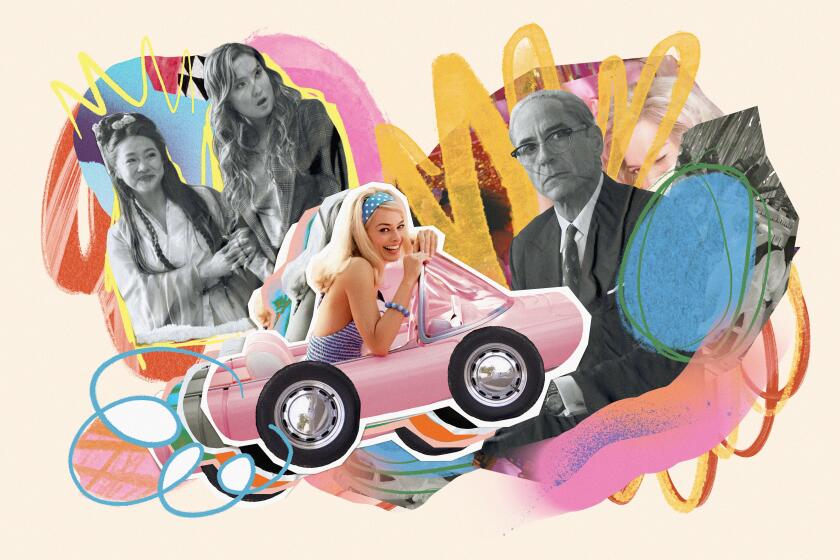Ryan Gosling and Greta Gerwig on how Ken became the subversive center of ‘Barbie’

- Share via
When Ryan Gosling first got the screenplay to “Barbie,” the title page read “Barbie and Ken” with the “and Ken” crossed out. It was the first sign that this particular script — co-written by the film’s director, Greta Gerwig, working with her life partner and frequent collaborator, Noah Baumbach — would be full of untamed wit.
“It just was like nothing I ever could have expected,” Gosling says. “Greta so brilliantly constructed it almost like an amusement park where you need no map. It’s just been designed so that you naturally ride the rides that she wants you to ride.”
In the world of the film there is “Barbie Land,” where the perfectly blond and beautiful Barbie (Margot Robbie) lives a frictionless, uncomplicated life marked by days at the beach and nighttime dance parties with her friends. More Barbies (Issa Rae, Hari Nef, Emma Mackey and Alexandra Shipp, among others) are the president, lawyers, doctors and prize-winning authors. As Helen Mirren’s narrator intones, “All problems of feminism and equal rights have been solved.”
That is until Robbie’s Barbie suddenly begins to have recurring thoughts of death and cellulite. Her boyfriend, Ken (Gosling), already lives a life marked by insecurity and anxiety, only at ease when he has Barbie’s attention. When Barbie decides to venture to the Real World in an attempt to solve her newfound problems, Ken tags along. There he learns about the patriarchy — and that he loves it — bringing those ideas back to Barbie Land to rechristen it his “Ken-dom” and refashioning Barbie’s dream house into his “mojo dojo casa house.”
And still, all he wants is for her to notice him. (It’s a sweet kind of rebellion.)
Diving into an explosive episode of 20th century history that launched the nuclear age, director Christopher Nolan unleashes the most ambitious film of his career.
So although the movie is definitely called “Barbie,” it is Ken who unexpectedly provides its emotional center, with Gosling’s performance arguably among the most rounded, poignant and plain greatest of his career.
As Ken. In the “Barbie” movie.
Gerwig says: “There was something really early when Noah and I were working on it — Ken as an accessory and how forgotten he is — we just felt, psychologically: That’s going to be the story. There’s [a] story there. How could there not be?”
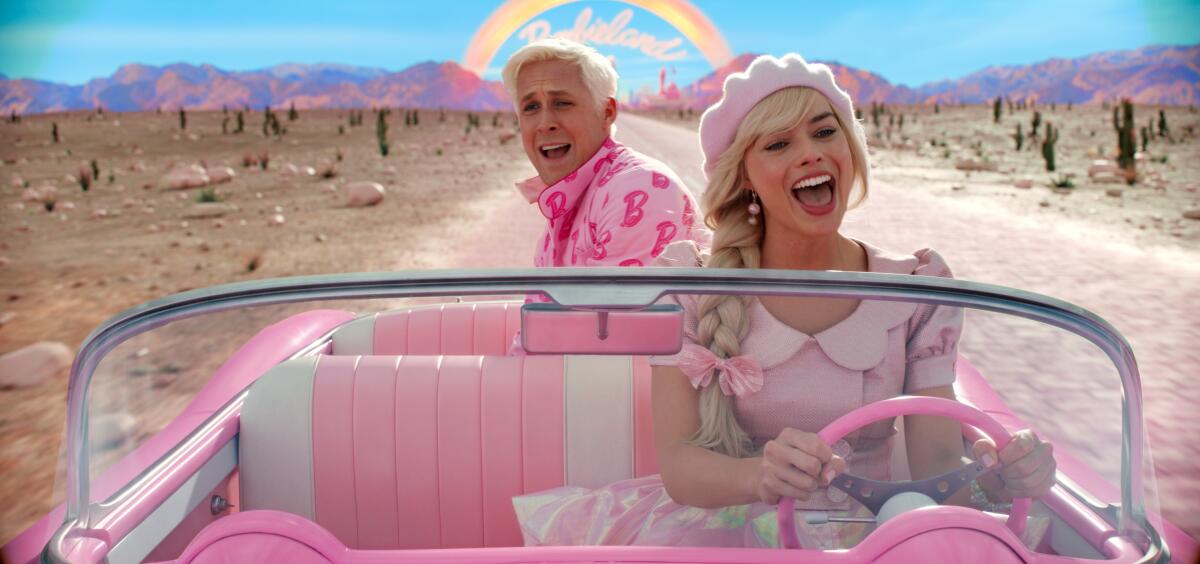
Gerwig and Baumbach, who co-wrote the screenplays to the Baumbach-directed “Frances Ha” and “Mistress America,” did extensive research into the history of Barbie, including such discontinued characters as Barbie’s pregnant friend Midge and Earring Magic Ken. (The “Lady Bird” and “Little Women” filmmaker was brought onto the project by Robbie, who as a producer obtained the rights from toy company Mattel through her company LuckyChap Entertainment.)
They took the work of creating the wildly stylized world of the movie quite seriously, and as Ken emerged, it became clear that portraying him would require a unique set of skills. Not just good looks, but also a comedic agility and a dramatic gravity that can be hard to find in a single performer.
“I didn’t know Ryan at all,” Gerwig says, “but Ryan was the person who was always in my mind going to play this role. I just knew he could be really funny but also would mine the depths of this kind of outrageous conundrum that Ken finds himself in, as a person.”
Gosling, who as a child performer appeared on the ’90s revival of “The Mickey Mouse Club,” has become one of the most charmingly enigmatic actors in Hollywood, with the leading-man looks of classic stars but an offbeat charisma distinctly his own. A two-time best actor Oscar nominee for “Half Nelson” and “La La Land,” Gosling has studiously avoided the superhero and franchise parts that have bogged down so many of his contemporaries, opting instead for unpredictable roles in films such as “The Notebook,” “Drive,” “The Nice Guys,” “Blade Runner 2049” and “First Man.” A through line in his work is that, for all of his brooding intensity, there’s often a lightness underneath.
“It was the gravitas he’s able to bring as an actor that was part of what made everything so heartfelt — but also so funny,” Gerwig says.

Gosling and Gerwig sit together in a Los Angeles hotel as part of the pink-hued whirlwind press event around “Barbie,” made with a reported production budget of $100 million and opening July 21. Simply getting them into the same room at the same time was no small feat: Gerwig would soon be on her way to a promotional tour of Australia and South Korea, while Gosling would head to his native Canada.
Suddenly a voice enters the room and asks, “Can I crash?” It’s Robbie in a dazzling canary-yellow Chanel outfit. Since Gosling won’t be making the trip to Australia, the Australian-born Robbie wants to be sure to give him a bag of honey-soy-chicken potato chips, which she declares one of her top three “chippie” flavors. As startlingly as she arrived, she is gone. On her way out the door, she trills, Harley Quinn-style, “Honestly, it tastes exactly like honey-soy chicken. You’ll see. Sorry for interrupting.”
Gerwig and Gosling are both left beaming. “Classic Robbie right there,” says Gosling.
“That is exactly who she is, 100% of the time,” Gerwig adds. “She’s like a beautiful lady who comes in and gives you food and gifts. I’ve been working with her on this for four years and there is no bad side. She’s just like an angel. I love her so much. I wish I could be like her. I’m always like, ‘What would Margot do?’ ”
“She might be one of the most capable people I’ve ever met,” adds Gosling. “If you were on a plane and the engine went out, you’d want Margot Robbie on your plane.”
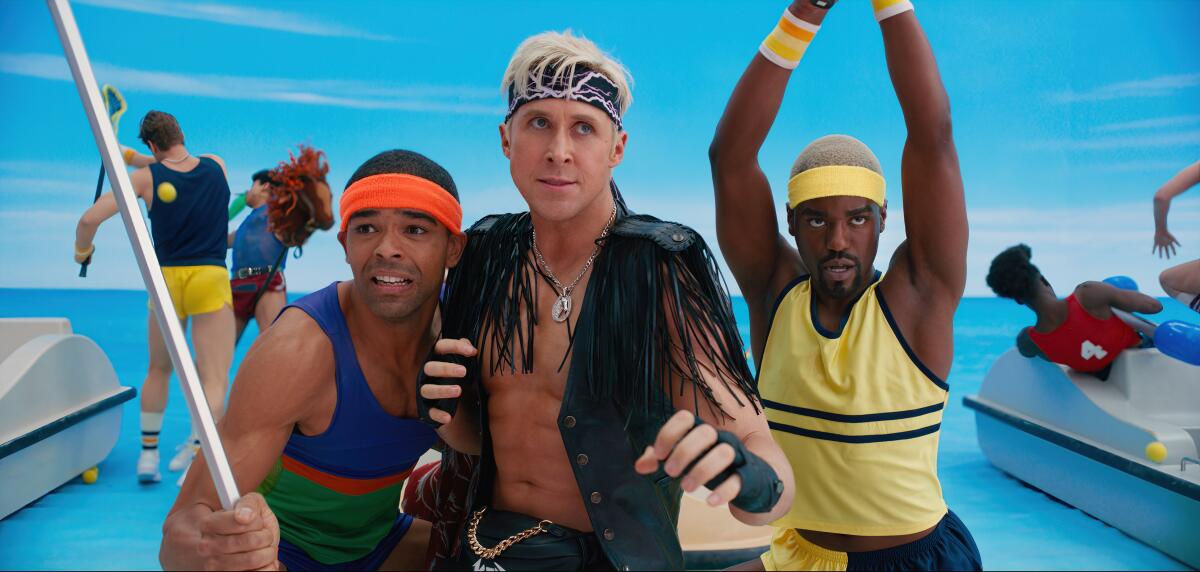
Robbie’s big Barbie energy takes a few moments to dissipate. Settling back in, Gerwig returns to explaining the origins of the stylized “dream ballet” dance number tucked inside the extended musical performance that is the power-ballad “I’m Just Ken,” a showstopping highlight sung by Gosling and written by Mark Ronson and Andrew Wyatt, who won Oscars for their work on the “A Star Is Born” hit “厂丑补濒濒辞飞.”
The dance number has its basis in the 1950s Gene Kelly musicals “Singin’ in the Rain” and “An American in Paris.” And while the extended interlude was not in the original script presented to Gosling, Gerwig said she “baby-stepped” everyone involved toward the idea, which to her seemed an obvious if oddball decision.
“I do remember everyone, including Noah, was like, ‘What is this dream ballet you want?’ ” Gerwig says. “And I was like, It’s going to be great. I just felt like it was just right there. It was exactly what the moment wanted to be.”
Times entertainment staffers circled these 15 summer movies on their calendars. So should you.
There had been rehearsals for Gosling to dance in a Sylvester Stallone-in-the-’80s-style, full-length mink coat that Ken wears once he becomes obsessed with men’s rights, so Gosling wasn’t thrown by the addition of an even more elaborate dance number just before shooting began.
“It felt so organic, as this whole process has,” Gosling says. “We were talking a lot about just being kids and coming from that place in a lot of these scenes. And when I was a kid, I was working and I was dancing at the mall or singing at weddings.
“And I thought, you know, that kid worked really hard and got me here. I owe everything to him, but I thought I had let him retire. Like, he’d worked enough and I could take it from here. But it was time to pull him out of retirement one more time for one last heist.”

Gosling also gives an uproariously straight-faced performance of the 1997 Matchbox 20 song “Push,” getting to the emotional manipulation underneath the song’s lyrics — including “I want to take you for granted” — while strumming a guitar by a campfire as he and the other Kens are driven to jealousy by Barbie and her friends.
“When you put on Greta Gerwig glasses, you start to see,” Gosling says. “I heard that song my whole life, but I had never heard that song really until she pointed it out.”
Gosling is reluctant to take credit for his performance of either song, in particular the way he belts out “I’m Just Ken” and its exhortation of “a life of blond fragility” with the conviction of a seasoned musical-theater performer.
“Ken sang that song,” Gosling says with a straight face. “I never sang like that in my life. I don’t know why or how that happened.”
Gosling, who has two young daughters with his partner, Eva Mendes, says their children had just begun to play with Barbie dolls themselves as “Barbie” arrived at his door. He noticed that his daughters did not refer to their Barbie dolls as Barbie but gave them their own names, jobs and complicated lives. But Ken remained very much outside of all that.
“There was such a synergy between what I was watching happening in my own house and then also the brilliance in the way that Greta was using these characters to do something similar,” Gosling says. “I walked into my backyard and I saw Ken laying facedown in the mud next to a squished lemon. And I thought, she’s right. This story does have to be told.”
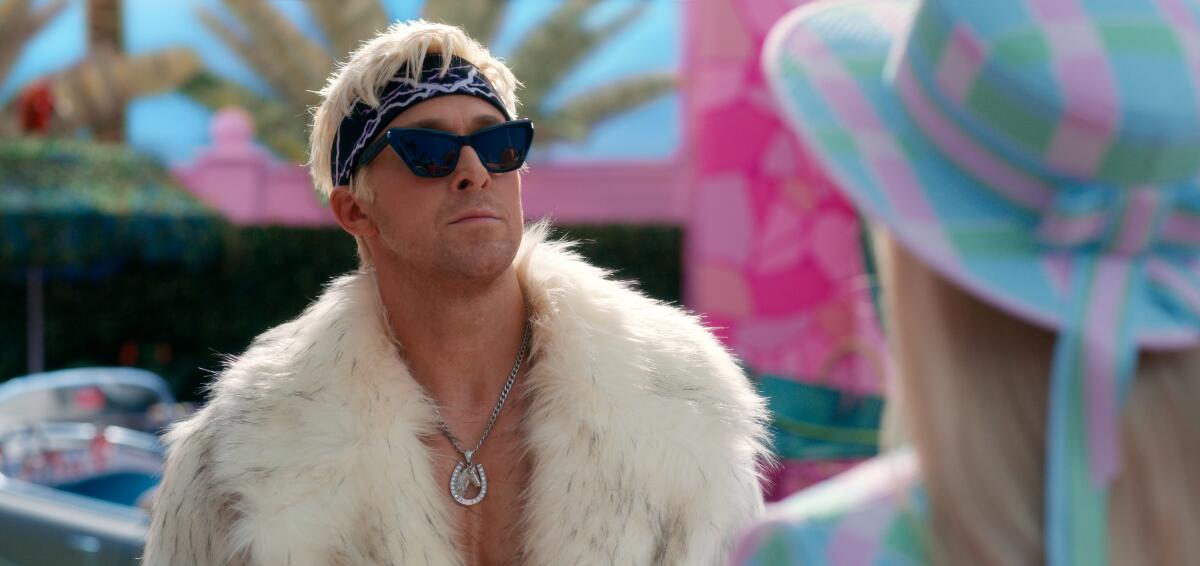
Gosling compares Gerwig’s vision to Milton Glaser’s iconic “I heart New York” logo for the way it grabs onto and defines the essence of something, creating something new that feels like it has always been there.
“In the way that I think an architect builds a model to understand how a building can exist in the world, it felt like that’s what Greta had done with this film,” Gosling said. “It was: How do we use these characters to understand how to live in the current world that we live in?”
For all of the pastel coloring and playful nods to the world of the toys, this is nevertheless a heady, philosophical take on Barbie that plays out as an existential crisis of self.
“Don’t say that,” jokes Gerwig at the implication of the film’s more intellectualized leanings. “Say it’s pink.”
So were there concerns about it being, well, too much?
“I’m still worried — I’m worried right now,” Gerwig says.
“It was kind of terrifying because when we were shooting, it was totally euphoric — such an act of anarchic, gleeful imagination,” she adds. “But then it was also these big choices.
“It was insane, from top to bottom. How we were doing it was crazy. What we were doing was bananas. And then also the core of it was this heady thing, but it was also a confection. But then I thought, ‘Well, they’re so great and all of this is so great and I’m enjoying it. Maybe other people will?’”

While it might be expected that a “Barbie” movie would be inspirational for women and young girls, the screenplay’s story line for Ken — falling into toxic masculinity and coming out the other side to a place of mutual appreciation — makes it a potential crossover for boys and men.
“He was freeing masculinity for everyone on set in this extraordinary way,” Gerwig says of Gosling’s performance, marked by a willingness to be both tough and tender. “And these men loved it. I think they felt released by Ken’s journey.”
During production, Gerwig began to notice male crew members suddenly wearing pink socks or humming the tune of “I’m Just Ken.” Gosling recalled walking behind a crew member who added his own name, changing the lyric to “I’m Just Chad.” Crew members also made their own shirts, pink with rainbow fringe on the sleeves, that many wore during the final days of production.
“Life is hard for everybody,” said Gerwig. “I think equally men have held themselves to just outrageous standards that no one can meet. And they have their own set of contradictions where they’re walking a tightrope. I think that’s something that’s universal. Just as much as women have been lost in some morass of how to do everything. I equally see that as true for men. For everybody. We equally beat ourselves up.”
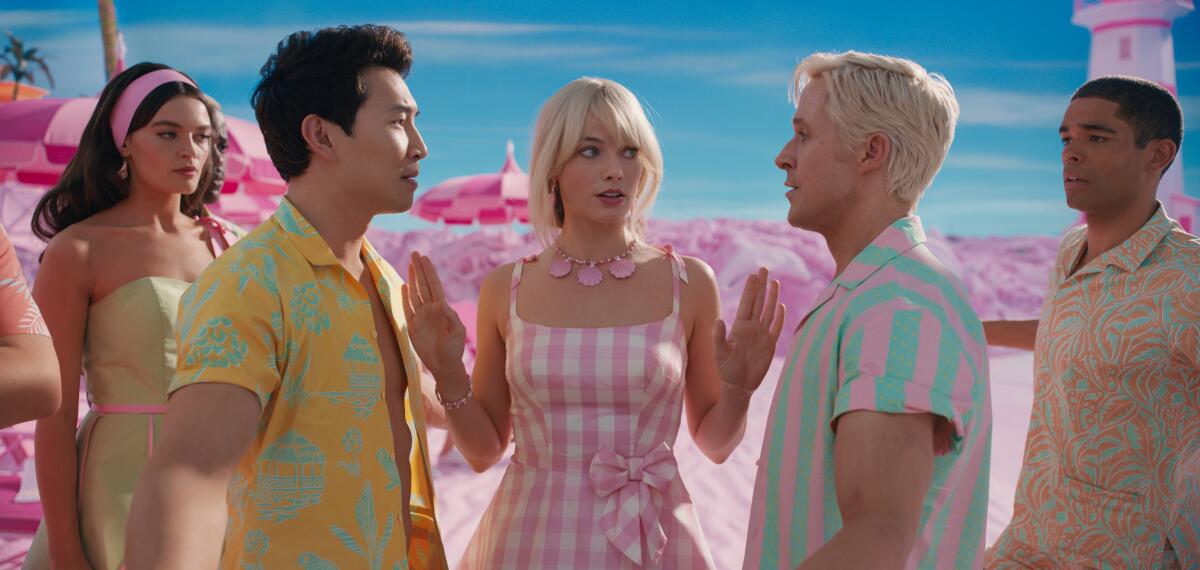
Whether out of personal reserve or movie-star savvy, Gosling defers to Gerwig’s answer on this point, preferring to let the work speak for him. “She gave me this opportunity to articulate myself in the best way I can, which is in my work,” he says. “So I was really grateful for that.”
The film has the potential to become a political football over Barbies of varying ethnicities, body types, disabilities and identities; a childlike depiction of a world map has already led to its being banned in Vietnam. So is there additional concern this will be decried in some circles as the “woke” Barbie movie?
“This Barbie movie is for all Barbies — all kinds, everybody,” Gerwig says. “This sounds so cheesy, but it really is full of love for all the ways people are, and all the struggles they have. And I know that’s really blanket, but I do mean it. I think people are really hard on themselves and they don’t need to be.”
She gives it a perfect pause, and then, much as her movie does, she smartly adds a dash of vinegar. In a stage whisper, Gerwig says, “Because we’re all going to die.”
More to Read
Only good movies
Get the Indie Focus newsletter, Mark Olsen's weekly guide to the world of cinema.
You may occasionally receive promotional content from the Los Angeles Times.
